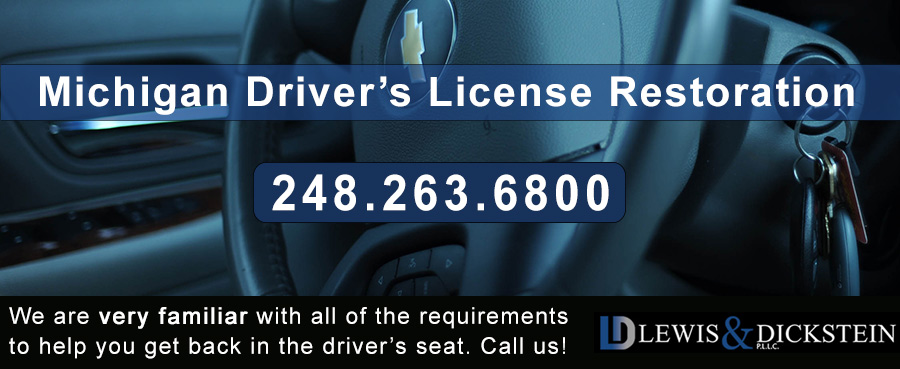Winning Driver’s License Appeal Hearings
Meticulous preparation is how you win a driver’s license appeal hearing. It can take decades to perfect a consistently successful system.

Why Preparing for a Driver’s License Appeal Hearing is Critical
A primary area of practice for LEWIS & DICKSTEIN, P.L.L.C., is representing those who have lost their driving privileges due to habitual or multiple drinking and driving offenses. We constantly hear story after story about those who have gone before the Driver’s License Appeal Division either unrepresented or underrepresented (represented by an inexperienced or ineffective attorney) and lost once…twice, or even more times. Our attorneys know exactly what is necessary to win a driver’s license appeal on the first try.
The fact is that successfully and consistently winning driver’s license appeal hearings after multiple convictions is complex, and it takes many years of experience and finely crafted, persuasive arguments. Regretfully, many practicing lawyers take on DAAD cases without knowing how to be successful and make misleading representations to potential clients that they are experienced and effective. Based upon the number of instances where people hire LEWIS & DICKSTEIN, P.L.L.C. to take over these cases, it appears very likely that the pool of knowledgeable and qualified attorneys is much smaller than they would have you believe.
What must you include in a request for a hearing before the DLAD?
To get a DAAD (formerly known as DLAD) hearing, you must present several different documents, including a Request for Hearing, a recent Substance Abuse Evaluation and drug test, and letters verifying abstinence from alcohol and controlled substances. The Request for Hearing must include specific, verifiable information supported by evidence. Even a minor mistake in any of this documentation can prove fatal to achieving restoration. You and your lawyer must take great care to ensure that all documents are in order and done correctly. If preparation is not thorough, winning a driver’s license appeal is doubtful.
Substance Abuse Evaluation
All Substance Abuse Evaluations are not the same, and some evaluators have more weight with the Michigan Department of State than others. Further, the evaluation itself must contain information and findings consistent with other evidence in the case, findings that are credible and persuasive, and that will be consistent and corroborate the testimony of the petitioner at the hearing. An experienced driver’s license restoration attorney may insist that the evaluation be modified until it is correct, error-free, and properly drafted. It is virtually impossible to win a driver’s license appeal with a poorly drafted evaluation that lacks credibility. Amazingly, many people seeking driver’s license restoration will look on the internet or in the Yellow Pages for a certified substance abuse counselor to do an evaluation. Even many lawyers will refer clients to just anyone or, even worse, let them find their own evaluator. Each region of the DLAD has its own idiosyncrasies. The lawyer has an obligation to ensure that the substance abuse evaluator knows how to complete the evaluation correctly.

Letters of Community Support
You must obtain documentation of your drinking and drug use habits in the form of notarized letters from people in your community who have frequent contact with you and may know something about your drinking habits and/or use of controlled substances. These would include immediate family members, other relatives, employers, friends, pastors, local police, a recognized support group such as 12-step meetings or Women for Sobriety, neighbors, or others with whom you associate. You must submit at least three (3) letters, but not more than six (6). These letters should be signed, notarized, and dated, and include the complete mailing address and daytime telephone number of the writer, and contain at least the following information about you. Consistent and credible letters are essential if you want to win a driver’s license appeal.
- What is their relationship to you?
- How long have they known you?
- How often do they see you?
- Have them describe their knowledge of your past and current use of alcohol and/or drugs, including frequency of use, the amount used, beverage and/or drug of choice, etc.
- When did you last use any alcohol and/or drugs? (This must be unequivocal and consistent.)
- What is their knowledge of your past and current involvement in treatment and/or a support group?
- Have them include other information they believe is important.
One of the most frequent reasons the DLAD denies license restoration is because of insufficient, unpersuasive, or contradictory letters. The format recommended by LEWIS & DICKSTEIN, P.L.L.C., has been developed over almost two decades and over the course of representing hundreds of clients. Even when we give clients an outline of how to draft the letters, it is not uncommon that the letters need to be revised, edited, and corrected multiple times. If the letters are not exceptional, it is doubtful the petitioner will be successful. Trying to figure this out on your own is very risky, and your chances of winning without sufficient letters are meager.
Top 5 Mistakes People Make When Seeking Driver’s License Restoration
The primary reason many people lose restoration hearings is a lack of preparation and attention to detail. A petitioner maximizes their odds of winning a driver’s license restoration with thorough preparation and by submitting persuasive and credible evidence of long-term sobriety. Here are the top five reasons people lose:
1) Filing too soon without enough sobriety
The majority of people file their applications before they gather sufficient documentation of their sobriety period. The state demands strong evidence showing both your complete drinking cessation and your development of lasting recovery stability. Applications generally fail when applicants do not present at least one year of verified clean time through credible documentation, evidence, and testimony.
2) Weak or inconsistent letters of support
Letters of support serve a purpose beyond providing character references. To win a driver’s license restoration, the letters need to prove your sobriety while explaining your positive life changes and supporting your personal statements. The absence of clear information, the presence of conflicting statements, or missing essential details in the letters will destroy your application.
3) Poor or incomplete substance use evaluation
The evaluation and drug test must be thorough, credible, and consistent with the petitioner’s other evidence of long-term sobriety. An unfamiliar or inexperienced evaluator produces weak reports that create potential problems. A drug screen that is incomplete or outdated will produce the same negative outcome. Your recovery story and letters of support need to align with these documents.
4) Ignoring ignition interlock violations
Solid evidence must support the explanation of skipped tests, positive alcohol readings, and tamper codes in interlock device programs. Hearing officers will make negative assumptions when you fail to address these issues. All incidents need documentation or trustworthy explanations to support them.
5) Treating it like simple paperwork
Some people think this is just about filling out forms. The process requires thorough and skilled legal preparation and consistent efforts. The absence of consistent evidence, unprepared testimony, and contradictions between statements will result in denial. The most effective applications create a unified narrative that demonstrates sustained sobriety over a long period.

What can you do to win your DLAD appeal after habitual drunk driving or OWI/DUI offenses?
Call LEWIS & DICKSTEIN, P.L.L.C. for help winning a driver’s license restoration appeal. Simply put, these cases are too complex, and the outcome is too important to risk them on self-representation or discount lawyers. Failure generally results in a one-year delay until another opportunity to request reinstatement. The lawyers with LEWIS & DICKSTEIN, P.L.L.C., have decades of experience successfully prosecuting driver’s license restoration appeals. We know the hearing officers, the most successful techniques, and the most persuasive arguments. Although no attorney can guarantee restoration in any case, if you want to maximize your chances of having your driving privileges restored, call us for a free consultation, and we will take the time to talk with you about your situation and determine the best strategy for you to get a valid driver’s license.
Call us today at (248) 263-6800 for a free consultation or complete an online Request for Assistance Form. We will contact you promptly and find a way to help you.












